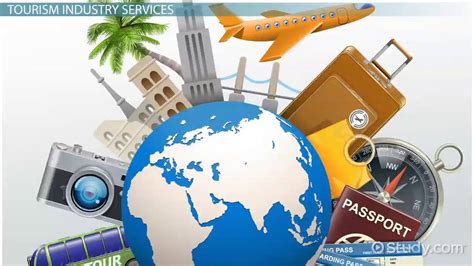Have you ever found yourself gazing out the window, mind wandering to distant horizons, yearning for an adventure beyond the boundaries of routine? If so, you are not alone. There is an innate desire within us to venture into new realms, to immerse ourselves in diverse cultures and to taste the thrill of professional growth in unfamiliar territories.
Is it really possible to merge work and travel seamlessly without compromising either? Yes! This comprehensive handbook will serve as your compass, guiding you towards transforming mere fantasies of working abroad into tangible opportunities. With the perfect blend of determination, perseverance, and strategic planning, you can embark on a journey where your professional aspirations and wanderlust intertwine harmoniously.
Within the following pages, we will unlock the secrets to transforming your dreams into exciting experiences that foster personal and professional growth. This article has been meticulously crafted to show you how to break free from the shackles of conventional workspaces and embrace the boundless possibilities that await you in a world waiting to be explored.
Exploring Industries That Offer Travel-Friendly Opportunities

When it comes to pursuing a career that accommodates your wanderlust, there are several industries that are known for their travel-friendly nature. This section will delve into different fields that provide ample opportunities to combine work and travel, allowing individuals to explore the world while still advancing their professional goals.
- Hospitality and Tourism: This dynamic industry offers a multitude of positions that involve travel, including hotel management, destination marketing, and tour guiding.
- Consulting: As a consultant, you can expect to travel frequently to various client locations, providing expertise and advice in your respective field.
- International Business: For those seeking a global experience, pursuing a career in international business can involve frequent travel to different countries for meetings, negotiations, and market research.
- Journalism and Media: Journalists and media professionals often get the chance to travel to different locations to cover stories, conduct interviews, and capture unique perspectives.
- Event Planning: Event planners often have the opportunity to organize conferences, trade shows, and exhibitions in different cities or countries, allowing them to immerse themselves in different cultures.
- Travel Writing and Blogging: This industry allows individuals to combine their passion for writing with their love for travel, documenting their experiences and sharing valuable insights with others.
These are just a few examples of industries that offer travel-friendly opportunities. However, it's essential to carefully research each field to understand the specific roles and requirements they offer. Finding the right industry that aligns with your skills, interests, and travel aspirations is key to making your dream of working and traveling a reality.
Developing a Diverse Skillset for Remote Work
In the pursuit of creating a successful career that allows for flexible remote work opportunities, it is crucial to invest in building a versatile skillset. Acquiring a wide range of skills not only enhances your value as a remote worker but also opens up various possibilities for remote work positions. With the ever-evolving landscape of remote work, a diverse skillset will enable you to adapt to different roles and industries, ensuring continued professional growth and success.
Expanding Your Skillset through Continuous Learning
One of the key strategies for building a versatile skillset is to prioritize continuous learning. This can be done by actively seeking out opportunities to gain new knowledge and acquire new skills. Taking online courses, attending webinars, participating in workshops, and engaging in industry-related events are excellent ways to stay updated on the latest trends and acquire relevant skills. Moreover, investing time in self-study and exploring new areas of interest can significantly contribute to the diversity of your skillset.
Embracing Multidisciplinary Skills
Remote work often requires individuals to take on multiple responsibilities and wear different hats. By developing multidisciplinary skills, you can position yourself as a valuable asset to employers who are seeking versatile remote workers. For example, if you have a background in marketing, consider enhancing your design skills or acquiring basic coding knowledge. Embracing a multidisciplinary approach will not only make you more adaptable to various remote work opportunities but also enable you to bring a unique perspective and problem-solving skills to your work.
Building Strong Communication and Collaboration Skills
In a remote work setting, effective communication and collaboration are vital for success. To build a versatile skillset, it is essential to hone your communication skills both in written and verbal forms. This includes improving your ability to articulate ideas clearly, actively listening to others, and fostering effective virtual communication. Additionally, developing strong collaboration skills, such as working well in virtual teams, being adaptable, and leveraging different communication tools, will further enhance your versatility as a remote worker.
Cultivating Adaptability and Resilience
Lastly, building a versatile skillset for remote work requires cultivating adaptability and resilience. The remote work landscape can be dynamic and unpredictable, and being able to adapt to new technologies, work processes, and environments is crucial. Additionally, remote work often comes with unique challenges, and having the resilience to overcome obstacles and bounce back from setbacks is essential. By continuously developing these qualities, you will be better equipped to navigate the diverse opportunities and challenges that remote work presents.
Building Connections: Connecting with Professionals in the Travel Industry

Developing a strong network of professionals in the travel industry is essential for those aspiring to turn their dreams of working in this field into a reality. In this section, we will explore effective strategies for building connections and fostering relationships with experienced individuals in the industry.
- Attending industry events and conferences: Participating in relevant conferences, trade shows, and events can provide invaluable opportunities to connect with professionals in the travel industry. These gatherings often include networking sessions where individuals can interact, exchange insights, and establish meaningful contacts.
- Joining professional organizations: Becoming a member of reputable travel industry associations can open doors to networking opportunities. These organizations often host events, seminars, and workshops, allowing individuals to connect with like-minded professionals who share their passion for travel.
- Utilizing online platforms: With the rise of social media and professional networking sites, it has become easier than ever to connect with professionals in the travel industry virtually. Taking advantage of platforms like LinkedIn and travel-focused forums can be an effective way to engage in industry-related discussions and establish connections.
- Reaching out to mentors: Seeking guidance from experienced professionals in the travel industry can provide valuable insights and opportunities for growth. Identifying individuals who can serve as mentors or advisors and reaching out to them with genuine inquiries can help establish fruitful connections.
- Attending local meetups: Exploring local travel-focused meetups or workshops can provide opportunities to connect with professionals in a more intimate and informal setting. These gatherings often foster a sense of community and enable individuals to build relationships with industry experts in their own region.
By actively engaging in networking activities and seeking out opportunities to connect with professionals in the travel industry, individuals can enhance their chances of fulfilling their dreams of working in this exciting field. Building a strong network not only allows for potential job opportunities, but also provides a valuable support system and a platform for knowledge exchange within the industry.
Creating an Agile Work Schedule while Exploring the World
Aspirations of embarking on a professional journey that allows you to see the world and work simultaneously are no longer unattainable dreams. This section will guide you through the process of developing a flexible work routine that enables you to balance your professional responsibilities with your wanderlust. By adopting a strategic approach to managing your time and tasks, you can create an agile work schedule that accommodates your desire to explore new destinations and immerse yourself in diverse cultures.
1. Embrace Remote Work Opportunities
To embark on a fulfilling travel experience while continuing to work, remote work opportunities lay the foundation for a flexible routine. Leveraging advancements in technology, remote work enables you to connect with your colleagues and clients from any location. By negotiating with your employer or seeking freelance projects that allow remote collaboration, you can establish a work arrangement that grants you the freedom to travel and explore without sacrificing your professional growth.
2. Prioritize Task Management and Time Allocation
Efficiently managing your tasks and allocating time accordingly is crucial in maintaining a flexible work routine while traveling. Utilize project management tools and establish a comprehensive schedule for your daily and weekly tasks. By setting realistic goals, prioritizing urgent assignments, and staying organized, you can effectively complete your work while ensuring you have ample time to indulge in the wonders of each travel destination.
3. Cultivate Effective Communication Skills
When traveling for work, cultivating effective communication skills becomes paramount. As you adapt to diverse environments and encounter language barriers, it is essential to explore alternative methods of communication. Mastering the art of clear and concise communication through various mediums such as email, video conferencing, and instant messaging allows you to effectively collaborate with colleagues and clients regardless of your physical location.
4. Seek Collaboration Opportunities
Traveling for work provides unique opportunities for collaboration and networking. Actively seek out local professionals or communities relevant to your field of work. By engaging in collaborative projects, attending industry conferences, or participating in networking events, you can enrich your professional experience while immersing yourself in the local culture. These connections can potentially lead to new work opportunities and expand your network across different geographies.
5. Embrace Flexibility and Adaptability
Lastly, developing a flexible work routine requires embracing the concepts of flexibility and adaptability. Every travel experience is unique, and unexpected situations may arise along the way. By being open to change, adjusting your schedule accordingly, and seeking innovative solutions to overcome challenges, you can successfully navigate through various work and travel scenarios. Embracing flexibility and adaptability empowers you to make the most of your professional journey while exploring the globe.
Overcoming Challenges: Tips for a Successful Work Experience on the Go

When embarking on a work experience that involves travel, there are certain challenges that you may encounter along the way. However, with careful planning and a proactive approach, these challenges can be overcome, ensuring a successful and rewarding journey.
- 1. Embrace Flexibility: Travelling for work often requires a flexible mindset. Adaptability and openness to changes in schedules, locations, and work environments are paramount to overcoming challenges.
- 2. Stay Organized: Maintaining a well-organized itinerary and keeping track of important documents, such as travel tickets and work-related paperwork, is crucial for a smooth experience.
- 3. Prioritize Communication: Effective communication is vital when working in unfamiliar surroundings. Keep in touch with your team, clients, and colleagues, and ensure clear and regular communication channels are established.
- 4. Cultivate Resilience: Facing unexpected obstacles is inevitable during traveling work experiences. Developing resilience and problem-solving skills will help you navigate through difficult situations with ease.
- 5. Take Care of Yourself: Amidst the excitement of traveling for work, it's essential to prioritize self-care. Maintain a healthy lifestyle, get sufficient rest, and find ways to relax and recharge during your journey.
- 6. Embrace Cultural Sensitivity: Working in diverse locations often means encountering different cultures and customs. Show respect and embrace cultural sensitivity, which will foster positive relationships with locals and enhance your overall experience.
- 7. Seek Support and Networking Opportunities: Reach out to fellow travelers, colleagues, or professional networks that can provide guidance and support during your work journey. Networking can open doors to new opportunities and help overcome hurdles.
- 8. Keep Learning and Growing: Traveling for work can be a valuable learning experience. Embrace new challenges, learn from different perspectives, and use the opportunity to expand your professional skills and knowledge.
By following these tips and adopting a proactive mindset, you can navigate the challenges of traveling for work and create a successful and enriching work experience on the go.
FAQ
How can I make my dream of traveling for work a reality?
If you dream of traveling for work, there are several steps you can take to make it a reality. First, assess your skills and determine if there are any remote or travel-friendly jobs that align with your expertise. Next, do thorough research on potential companies or industries that offer travel opportunities. Networking with professionals in your desired field can also provide valuable insights and connections. Additionally, consider taking courses or gaining certifications that can enhance your qualifications for travel-related work. Finally, be open-minded, flexible, and proactive in seeking out opportunities. With dedication and persistence, you can turn your dream of traveling for work into a reality.
What are some remote jobs that offer travel opportunities?
There are various remote jobs that offer travel opportunities. Some popular options include freelance writing or blogging, digital marketing, web development, graphic design, and consulting. These jobs allow for flexibility in terms of location and often require travel to meet clients or attend conferences and events. Additionally, jobs in the tourism industry, such as tour guides or travel consultants, often involve traveling to different destinations. It's important to research and identify the specific roles and industries that align with your skills and interests to find remote jobs that offer travel opportunities.
How can networking help me in finding work that involves travel?
Networking can play a crucial role in finding work that involves travel. By connecting with professionals in your desired field who already have experience or knowledge of travel-related work, you can gain valuable insights, advice, and potential job leads. Attending industry events, conferences, and trade shows can provide opportunities to meet people who may be able to help you find work that involves travel. Additionally, utilizing online platforms and communities, such as LinkedIn or professional forums, can help expand your network and connect with like-minded individuals who share your passion for traveling for work.
What skills or qualifications are important for obtaining work that involves travel?
Obtaining work that involves travel often requires a combination of certain skills and qualifications. Depending on the specific job or industry, some key skills that can be valuable include adaptability, communication skills, problem-solving abilities, and a strong sense of organization. Additionally, having relevant experience or education in areas such as international business, languages, hospitality, or event planning can enhance your qualifications for travel-related work. It's also important to demonstrate a genuine passion for travel and an ability to thrive in diverse and unfamiliar environments.



